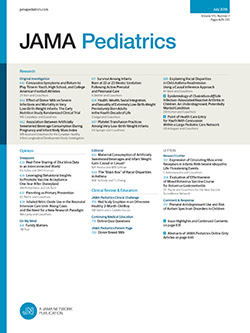父亲围产期抑郁、焦虑、压力与儿童发展:一项系统回顾和荟萃分析。
IF 18
1区 医学
Q1 PEDIATRICS
引用次数: 0
摘要
本系统综述和荟萃分析综合了现有关于父亲围产期精神困扰(即抑郁、焦虑和压力)与后代从出生到青春期发育之间关系的文献。目的对18岁前父亲围产期抑郁、焦虑和压力与后代发育的关系进行meta分析。我们检索了MEDLINE Complete, Embase, PsycINFO, CINAHL Complete,以及截至2024年11月发表的研究的灰色文献。研究选择纳入标准包括英语可用性、人类样本、定量数据、纵向设计,以及父亲围产期精神困扰和后代发育的测量。在确定的9572项研究中,48个队列(来自84项研究)和674个效应量符合定量综合标准(包括286个来自博士论文或通过与符合条件的研究作者联系获得的未发表的关联)。采用单变量随机效应模型定量综合父亲围产期心理困扰与后代发育之间的关系。使用美国国立卫生研究院的观察性、队列和横断面研究质量评估工具评估研究质量。数据分析于2025年1月完成。主要结果和测量主要结果是孩子在18岁前的整体、社会情感、适应性、认知、语言、身体和运动发育。结果父母围产期精神困扰与整体较差相关(r = -0.12;95% CI, -0.22至-0.01),社会情感(r = 0.09;95% CI, 0.07-0.11),认知(r = -0.07;95% CI, -0.13 ~ -0.01),语言(r = -0.15;95% CI, -0.25 ~ -0.05)和身体发育(r = 0.04;95% CI, 0.00-0.08)。没有发现适应性和运动结果的证据。与产前精神痛苦相比,产后精神痛苦的关联性更强,这表明父亲的精神状态可能对孩子出生后的发育产生更直接的影响。结论和相关性本系统综述和荟萃分析的证据表明,父亲精神困扰是儿童发展的一个潜在的可改变的预测因子。因此,减少父亲围产期的精神痛苦是预防性干预措施的一个重要目标,这些干预措施旨在支持父亲向父母过渡,促进下一代的健康和福祉。本文章由计算机程序翻译,如有差异,请以英文原文为准。
Paternal Perinatal Depression, Anxiety, and Stress and Child Development: A Systematic Review and Meta-Analysis.
Importance
This systematic review and meta-analysis comprehensively synthesizes the extant literature on the association of paternal perinatal mental distress (ie, depression, anxiety, and stress) with offspring development from birth to adolescence.
Objective
To provide a meta-analytic synthesis of the literature on the association between paternal perinatal depression, anxiety, and stress and offspring development during the first 18 years of life.
Data Sources
We searched MEDLINE Complete, Embase, PsycINFO, CINAHL Complete, and the gray literature for studies published up to November 2024.
Study Selection
Inclusion criteria included availability in English, a human sample, quantitative data, longitudinal design, and having a measure of paternal perinatal mental distress and offspring development.
Data Extraction and Synthesis
Of the 9572 studies identified, 48 cohorts (from 84 studies) with 674 effect sizes met criteria for quantitative synthesis (including 286 unpublished associations sourced from doctoral theses or through contact with authors of eligible studies). Univariate random-effects models were used to quantitatively synthesize the associations between paternal perinatal mental distress and offspring development. Study quality was assessed using the US National Institutes of Health quality assessment tool for observational, cohort, and cross-sectional studies. Data analysis was completed in January 2025.
Main Outcomes and Measures
The primary outcomes were global, social-emotional, adaptive, cognitive, language, physical, and motor development in offspring in the first 18 years of life.
Results
Paternal perinatal mental distress was associated with poorer global (r = -0.12; 95% CI, -0.22 to -0.01), social-emotional (r = 0.09; 95% CI, 0.07-0.11), cognitive (r = -0.07; 95% CI, -0.13 to -0.01), language (r = -0.15; 95% CI, -0.25 to -0.05), and physical development (r = 0.04; 95% CI, 0.00-0.08) in offspring. No evidence was found for adaptive and motor outcomes. Associations were generally stronger for postnatal than antenatal mental distress, suggesting that a father's mental state may exert a more direct influence on the developing child after birth.
Conclusions and Relevance
Evidence from this systematic review and meta-analysis indicates that paternal mental distress is a potentially modifiable predictor of child development. Reducing mental distress in fathers perinatally is thus an important target for preventative interventions aiming to support fathers during the transition to parenthood and promote the health and well-being of next-generation offspring.
求助全文
通过发布文献求助,成功后即可免费获取论文全文。
去求助
来源期刊

JAMA Pediatrics
PEDIATRICS-
CiteScore
31.60
自引率
1.90%
发文量
357
期刊介绍:
JAMA Pediatrics, the oldest continuously published pediatric journal in the US since 1911, is an international peer-reviewed publication and a part of the JAMA Network. Published weekly online and in 12 issues annually, it garners over 8.4 million article views and downloads yearly. All research articles become freely accessible online after 12 months without any author fees, and through the WHO's HINARI program, the online version is accessible to institutions in developing countries.
With a focus on advancing the health of infants, children, and adolescents, JAMA Pediatrics serves as a platform for discussing crucial issues and policies in child and adolescent health care. Leveraging the latest technology, it ensures timely access to information for its readers worldwide.
 求助内容:
求助内容: 应助结果提醒方式:
应助结果提醒方式:


